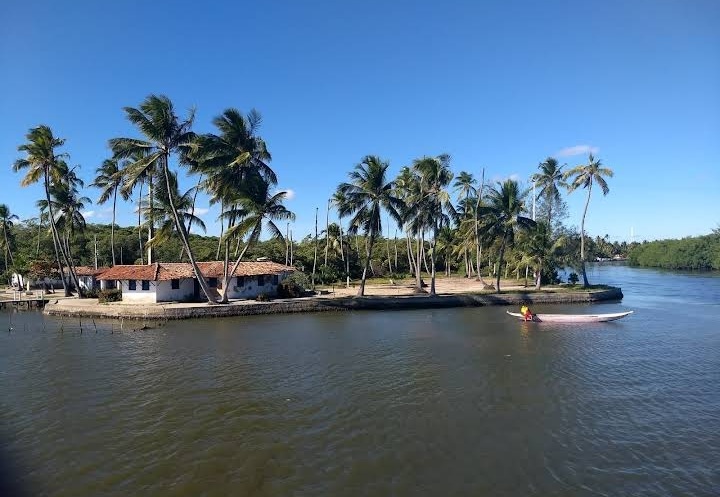
Rhythms and Roots: Exploring Festival de Maracatu in Ipojuca, Pernambuco
Experience the pulsating heart of Afro-Brazilian culture at Festival de Maracatu in Ipojuca, Pernambuco. This annual event offers a vibrant mix of drumming, dance, and historical tradition that brings the streets alive with energy and color.
Wear Comfortable, Sturdy Footwear
Cobblestone streets and uneven pavement require solid shoes with good support and grip to navigate safely during the festival.
Stay Hydrated Throughout the Festival
Pernambuco’s tropical heat combined with hours of dancing and standing means carrying a water bottle is crucial to avoid dehydration.
Arrive Early to Secure Good Viewing Spots
Crowds grow quickly as the drumming intensifies. Get to the heart of the action early to find a vantage point where you can comfortably watch or join the parade.
Learn Basic Maracatu Rhythms
Familiarizing yourself with the basic drum patterns before attending will make your experience more immersive and respectful of the tradition.
Rhythms and Roots: Exploring Festival de Maracatu in Ipojuca, Pernambuco
The Festival de Maracatu in Ipojuca, Pernambuco, bursts with vibrant energy and profound cultural heritage. This annual event celebrates Maracatu, a traditional Afro-Brazilian performance art mixing drumming, dance, and regal pageantry that commands attention with every beat. Ipojuca’s streets transform into rhythmic arenas where the pounding of alfaias (bass drums) and the call of gonguês (metal bells) dare you to move alongside the performers. The festival is rooted deeply in history, tracing back to African communities who brought their rhythms and stories into Brazil, keeping them fiercely alive.
Held usually during the June festivities, coinciding with Saint John celebrations, the Festival de Maracatu invites travelers to engage both as spectators and participants. The main action takes place in Ipojuca’s historical center, where colorful costumes shimmer in the sun and dancers, clad in colonial-style regalia, pivot with a confident grace. The drummers lead, their rhythms pushing time forward — wild and insistent, like the ocean tides nearby that shape Pernambuco’s coastline.
If you plan to experience the festival, prepare for a sensory onslaught tempered by practical details. The streets can get crowded, and the steady drum rhythms offer no pause, so stamina helps. Comfortable shoes are key — cobblestones and uneven pavement challenge your footing. Hydration is imperative, especially given Pernambuco’s warm climate during the festival months.
Participation varies. You can join organized parades or find quieter moments watching from the sidelines in the warm light of dusk. Local vendors line the streets, offering traditional foods such as tapioca pancakes and freshly squeezed sugarcane juice, fueling your energy for the night ahead.
Beyond the performances, the festival offers insight into Pernambuco’s culture and history, with each drumbeat tethering you to centuries of resilient tradition. This is an adventure of sound and movement, an encounter with a culture fiercely itself — demanding respect, attention, and an open heart.
Nearby Trips
All Adventures
Boat Charters
Water Activities
Adventures near Ipojuca, Pernambuco
Discover the unique and memorable adventures that make Ipojuca, Pernambuco special.
Frequently Asked Questions
What exactly is Maracatu and why is it important?
Maracatu is a traditional Afro-Brazilian performance art combining music, dance, and pageantry rooted in history from enslaved Africans in Brazil. It's a vibrant cultural expression of heritage, resistance, and community identity that persists strongly in Pernambuco.
Are visitors allowed to participate in the Maracatu parades?
Yes, visitors can often join in. Many groups encourage observers to learn basic rhythms and dance moves, fostering an immersive experience. However, it’s respectful to observe local cues and ask before joining.
What should I avoid during the festival?
Avoid wearing high heels or open sandals due to uneven surfaces, steer clear from pushing through dense crowds, and respect performers’ space to preserve the authenticity and safety of the event.
Is the festival suitable for children or older adults?
The movement and noise levels can be intense, so while families do attend, consider stamina and sensitivity to loud drumming when bringing children or older adults.
What local foods can I try at the festival?
Traditional foods like tapioca crepes, carne de sol (sun-dried beef), and fresh sugarcane juice are widely available, offering a taste of local flavors that complement the rhythmic festivities.
How can I learn more about Maracatu history while in Ipojuca?
Local museums and cultural centers in Recife and Ipojuca offer exhibits and workshops. Additionally, guided tours during the festival often include insights into the historical context of Maracatu traditions.
Recommended Gear
Comfortable walking shoes
Durable footwear protects your feet from rough cobblestones and supports long hours on your feet.
Reusable water bottle
Keep hydrated in Pernambuco’s tropical heat. Many vendors fill bottles at stands throughout the festival.
Lightweight, breathable clothing
Wear clothes that allow skin to breathe and help manage the humidity and heat during daytime and early evening.
Portable phone charger
Capture the festival’s moments and stay connected; batteries drain quickly with photos and videos.
Local Insights
Hidden Gems
- "The quiet courtyard at Igreja Matriz de Santo Antônio where soft echoes of drums sometimes linger"
- "Small artist workshops in Ipojuca’s backstreets displaying handcrafted Maracatu costumes"
Wildlife
- "Urban birds like the Rufous-bellied Thrush nesting quietly among festival noise"
- "Nearby mangroves teem with fiddler crabs and small reptiles that thrive despite the festival bustle"
History
"Maracatu in Pernambuco dates back to colonial times, establishing strong African cultural roots preserved through music and performance. This festival honors that lineage with both reverence and lively celebration."
